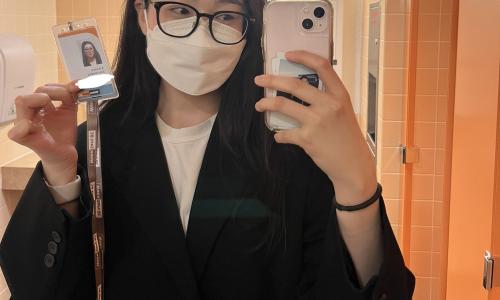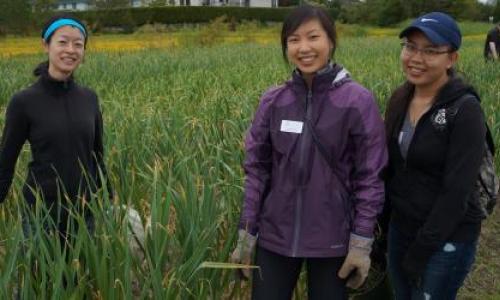
In my second co-op work term, I was on a hiring committee as a curriculum and programming assistant at SFU Career and Volunteer Services. Before I had experience on the committee, I had no idea the amount of thought and preparation that went into hiring on the employer’s end. I thought the hours spent writing cover letters, researching companies, and preparing for interviews to potential employers were a one-sided, frustrating effort. It felt like the decisions happening on the other side were based on arbitrary, random decisions.
Little did I realize, there are multiple reasons for why employers make their hiring decisions. Once I was in put in their position, reading over some resumes and cover letters, and conducting several interviews, it made me realize it's not easy to assess a human being’s entire skillset and work ethic with a few pieces of paper and a 30-40-minute introduction. That is why every little interaction matters. The process helped me self-correct my own approach to future interviews and realize what employers are looking for, and how to stand out from the competition.
With all my new information, I made a list of 10 things to do when you’re getting ready for a co-op interview. The first 5 tips are what you can before the interview.
1. Do Your Research
Use the Co-op Work Reports to find the same job you’re applying for, within the same company. If you can’t, or are not a co-op student, a good idea is to find other jobs within that same company so you can glean the workplace culture. Sometimes roles get combined, renamed or absorbed into other roles. If you can’t and still don’t quite know what your position fully entails, try and find other work reports with the same or a similar job title as you in the OLC Job Description Gallery. In that same vein, research the company as well as their recent initiatives, events, or products and bring it up in the interview to show you’re genuinely interested in the company.
2. Do Interview Prep
Maybe you’ve had help with generic interview prep before, and that is fine. But the Co-op department and Career and Volunteer Services have contacts, knowledge and information specific to a lot of jobs and companies. I remember one instance where a co-op advisor gave me a list of previously asked questions, they knew the name and style of my interviewer, and they gave me a practice interview. The co-op department is a valuable resource that can’t be replicated anywhere else. They’re also free to co-op students, and very friendly (If you aren’t a co-op student, I’d recommend using Career and Volunteer Services instead - free to all SFU students, and also very friendly!).
3. Prepare a Work Sample
The employer might ask you to show a sample of your work before, after or even DURING an interview; writing, design/graphics, a snippet of a research paper, it depends on the job. No matter what work term you're in, just a piece or two of work you’ve done for a relevant class, in another job, or a project you’ve put together on your own time will work great.
4. Respond to Every Email
Even if it's just an acknowledgement that you’ve read the email. When you actually get scheduled for an interview and they email you the interview details, it's also a good idea to let your interviewers know you’ll be there. Communication skills in all jobs are important, and it’ll send a message to the employer that you’re on top of things and they won’t have to chase you down for answers. If you don’t email them back it shows future poor communications skills. Even if it feels like an email doesn’t warrant a response, it’s better to be safe than sorry.
5. Put in the Extra Work
If there is an “optional” cover letter, submit a cover letter. It shows dedication, and willingness to go the extra mile. Also, a resume is 2 pages and more generalizable than a cover letter. Without a cover letter, your potential employer has only 2 pages of a resume to judge your abilities. It is extremely difficult to stand out, so if there is an optional extra writing sample to submit, doing so will help your case immensely. It will exponentially increase the odds that you will get an interview.
The next 4 tips are what you can do to stand out during an interview:
6. Ask Questions
You have to show you’re not afraid to ask questions. In a lot of jobs, being able to ask for clarity and help when you need to is an asset. It’s best to double check if you’re unsure, rather than expend energy answering the wrong question.
7. Use Real Life Examples
Acronyms like “STAR” (Situation, Task, Action, Result) help, but always remember to relate your previous experiences and explain how that experience could turn out to be an asset in the new workplace.
A possible question could be something like “describe a time you’ve dealt with a challenge and how it was resolved”. My sample answer to balancing multiple deadlines would be something like, “As a 3rd year SFU student, I have had to do 3-4 final exams during the same month, or week, for years (situation). That means I have to find time to study for all those exams on a tight schedule (task). What helps me when I’m faced with multiple deadlines and time pressure is organizing a schedule on my google calendar and scheduling study time for each subject so I know I can make time to learn everything I need to for the exam (action). As a result, I have been able to pass all my exams, while reducing the amount of stress that normally occurs during exam season.” Try to list relevant work ethics and transferrable skills (ex. organization, communication) in your response.
8. Ensure Active Listening
It is a good idea to repeat bits of information from the job post, or from what your interviewers have said about the position or company. Oftentimes at the end of an interview, they’ll ask some variation of the question, “why are you the best fit for this position?”. This is the perfect opportunity to show them you have been paying attention by repeating back key bits of information to them, as well as how your experience, skills and values align with their ideal candidate.
9. Prepare Questions
A list of 3-5 questions is always a good idea to have. It shows that you have genuine interest in the role and preparedness on your part. Even if the questions you’ve prepared have been answered over the course of the interview, it's always good to mention that you had some and what they were, but they’d been answered.
The last, but certaintly not the least, tip is to,
10. Write a Thank-You Email
It doesn’t have to be very long, like a cover letter. It should simply say thank you for meeting with me and, the most important thing the email should convey, aside from politeness and communication is, that you’re still interested in the role after your interview. Sometimes students have other interviews or job offers or learn more about the details of the position during the interview and become disinterested. Always follow up your interview with a thank you email within 24 hours of the interview date. There is discourse about whether thank-you emails should factor in hiring decisions at all, but the fact is that some hiring managers refuse to hire someone who doesn’t write a thank-you email, and the general consensus is that it’s an implicit expectation in most places. Again, every little interaction counts when it comes to hiring. So please do yourself a favor and write a thank-you email!














